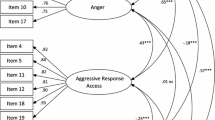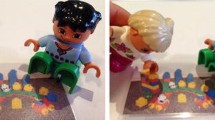Abstract
From a cognitive point of view the way children process the social stimuli from their current environment plays a part in the generation of aggressive behaviour. Initially, studies of social cognition in children with aggressive behaviour were Piagetian in orientation. Some recent models, notably one by Dodge, are based on cognitive theories of information-processing. Studies based on these social information-processing models give a picture of an aggressive child who is not only developmentally retarded, as demonstrated in Piagetian studies, but is also deviant. More specifically, deficits as well as biases have been demonstrated in the child's encoding of social cues, in its interpretation of these cues, and in its generation, evaluation and selection of behavioural responses. These findings may bring about improvements in the cognitive-behavioural treatment of children with aggressive behaviour, the only child-focused therapy that has so far been shown to have any effect.
Résumé
D'un point de vue cognitif la façon dont les enfants traitent les stimuli sociaux provenant de leur environnement courant joue un rôle dans la genèse des comportements agressifs. Initialement, les études cognitivo-sociales d'enfants avec comportement agressif étaient d'orientation piagetienne. Des modèles récents, notamment celui de Dodge, s'appuient sur les théories cognitives de l'intégration de l'information. Les études fondées sur ces modèles donnent un tableau de l'enfant agressif qui n'est pas seulement en retard sur le plan développemental, comme l'ont montré les études piagetiennes, mais qui est aussi dévant. Plus spécifiquement, des déficits aussi bien que des déviances ont pu être démontrés dans le processus d'évaluation et la sélection des réponses comportementales. Ces faits peuvent apporter des améliorations dans le traitement cognitivo-comportemental des enfants agressifs, le seule thérapie centrée sur l'enfant pour laquelle un certain effet a pu être démontré.
Zusammenfassung
Aus einer kognitiven Sichtweise spielt die Art und Weise, wie Kinder die sozialen Reize ihrer gegenwärtigen Umgebung verarbeiten, eine Rolle bei der Erzeugung von aggressivem Verhalten. Ursprünglich waren Untersuchungen zur sozialen Kognition bei Kindern mit aggressivem Verhalten nach Piaget ausgerichtet. Einige neuere Modelle, besonders ein Modell von Dodge, beruhen auf kognitiven Theorien der Informationsverarbeitung. Studien, die auf diesen Modellen der sozialen Informationsverarbeitung basieren, ergeben das Bild eines aggressiven Kindes, das nicht nur entwicklungsretardiert, wie in Untersuchungen nach Piaget gezeigt, sondern auch fehlentwickelt ist. Genauer ausgedrückt, sind kindliche Defizite und Fehldeutungen bei der Interpretation von sozialen Reizen und bei der Generierung, Evaluierung und Selektion von Verhaltensreaktionen nachgewiesen worden. Diese Ergebnisse könnten zu einer Verbesserung der kognitiven Verhaltenstherapie von Kindern mit aggressivem Verhalten führen—der einzigen kindzentrierten Therapie, bei der bislang ein Effekt nachgewiesen wurde.
Similar content being viewed by others
References
Abikoff, H., Gittelman, R. & Klein, D. (1980). A classroom code for hyperactive children: a replication of validity.Journal of Consulting and Clinical Psychology, 48, 555–565.
Bandura, A. (1986).Social Foundations of Thoughts and Actions: A Social Cognitive Theory. Englewood Cliffs, NJ: Prentice-Hall.
Braswell, L. & Kendall, P. (1988). Cognitive-behavioral methods with children. In K. Dobson (ed.), Handbook of cognitive behavioral therapies (pp. 167–213). London: Hutchinson.
Chalmers, J. & Townsend, M. (1990). The effect of training in social perspective taking in socially maladjusted girls.Child Development, 61, 178–190.
Chandler, M. (1973). Egocentrism and antisocial behavior: The assessment and training of social perspectivetaking skills.Developmental Psychology, 9, 326–332.
Chandler, M., Greenspan, S. & Barenboim, C. (1974). Assessment and training of role-taking and referential communication skills in institutionalized emotionally disturbed children.Developmental Psychology, 10, 546–553.
Cohen, N., Kershner, J. & Wehrspann, W. (1985). Characteristics of social cognition in children with different symptom patterns.Journal of Applied Developmental Psychology, 6, 277–290.
Coie, J., Dodge, K. & Kupersmidt, J. (1990). Peer group behavior and social status. In S. Asher & J. Coie (Eds.),Peer Rejection in Childhood (pp. 17–59). Cambridge: Cambridge University Press.
Deluty, R. (1983). Children's evaluations of aggressive, assertive and submissive responses.Journal of Clinical Child Psychology, 12, 124–129.
Dodge, K. (1980). Social cognition and children's aggressive behavior.Child Development, 51, 162–170.
Dodge, K. (1986). A social information processing model of social competence in children. In M. Perlmutter (Ed.),Minnesota Symposium on Child Psychology (Vol. 18, pp. 77–125). Hillsdale, NJ: Erlbaum.
Dodge, K. & Coie, J. (1987). Social-information-processing factors in reactive and proactive aggression in children's peer groups.Journal of Personality and Social Psychology, 52, 1146–1158.
Dodge, K., McClaskey, C. & Feldman, E. (1985). A situational approach to the assessment of social competence in children.Journal of Consulting and Clinical Psychology, 33, 344–353.
Dodge, K. & Newman, J. (1981). Biased decision making processes in aggressive boys.Journal of Abnormal Child Psychology, 9, 375–379.
Dodge, K., Pettit, S., Mc Claskey, C. & Brown, M. (1986). Social competence in children.Monographs of the Society for Research in Child Development, Serial No. 213, Vol. 51, No 2.
Dodge, K., Price, J., Bacharowski, J. & Newman, J. (1990). Hostile attributional biases in severely aggressive adolescents.Journal of Abnormal Psychology, 9, 385–392.
Dodge, K. & Tomlin, A. (1987). Utilization of self-schemas as a mechanism of interpretational bias in aggressive children.Social Cognition, 5, 280–300.
Dolgin, K. (1986). Needed steps for social competence: strengths and present limitations of Dodge's model. In M. Perlmutter (Ed.),Minnesota Symposium on Child Psychology (Vol. 18, pp. 127–135). Hillsdale, NJ: Erlbaum.
Flavell, J. (1985).Cognitive Development. New Jersey: Prentice Hall.
Flavell, J., Botkin, P., Fry, C., Wright, J. & Jarvis, P. (1968).The Development of Role-Taking and Communication Skills in Children. New York: Wiley.
Goldfried, M. & d'Zurilla, T. (1969). A behavioral-analytic model for assessing competence. In C. Spielberger (Ed.),Current Topics in Clinical and Community Psychology (Vol. 1, pp. 151–196). New York: Academic Press.
Guerra, N. & Slaby, R. (1989). Evaluating factors in social problem solving by aggressive boys.Journal of Abnormal Child Psychology, 17, 277–289.
Hayes, J. (1981).The Complete Problem Solver. Philadelphia: The Franklin Institute Press.
Hetherington, E. & Martin, B. (1986). Family factors and psychopathology in children. In H. Quay & J. Werry (Eds.),Psychopathological Disorders in Childhood (pp. 332–390). New York: Wiley.
Honess, T. (1980). Girls' and boys' perception of their peers: Egocentricity or collaboration?Child Development, 51, 476–480.
Kazdin, A. (1985).Treatment of Antisocial Behavior in Children and Adolescents. Homewood, IL: Dorsey Press.
Kazdin, A. (1987).Conduct Disorder in Childhood and Adolescence. Newbury Park, CA: Sage.
Kazdin, A., Esveldt-Dawson, K., French, N. & Unis, A. (1987). Problem-solving skills training and relationship therapy in the treatment of antisocial child behavior.Journal of Consulting and Clinical Psychology, 55, 76–85.
Kendall, P. & Braswell, L. (1985).Cognitive-Behavioral Therapy for Impulsive Children. New York: Guilford Press.
Light, P. (1987). Taking roles. In J. Bruner & H. Haste (Eds.),Making Sense (pp. 41–61). London: Methuen.
Matthys, W. (1990). De zelf/ander-representaties van gedragsgestoorde kinderen.Een empirisch onderzoek naar interne objectrelaties. Dissertation. Self/other representations in children with conduct disorders (with a summary in English). Amsterdam/Lisse: Swets en Zeitlinger.
Milich, R. & Dodge, K. (1984). Social information processing in child psychiatric populations.Journal of Abnormal Child Psychology, 12, 471–490.
Mischel, W. (1968).Personality and Assessment. New York: Wiley.
Neale, J. (1966). Egocentrism in institutionalized and non-institunionalized children.Child Development, 37, 97–101.
Newell, A. & Simon, H. (1972).Human Problem Solving. Englewood Cliffs, NJ: Prentice-Hall.
Peevers, S. & Secord, P. (1973). Develomental changes in attribution of descriptive concepts to persons.Journal of Personality and Social Psychology, 27, 120–128.
Pellegrini, D. & Urbain, E. (1985). An evaluation of interpersonal cognitive problem solving training with children.Journal of Child Psychology and Psychiatry, 26, 17–41.
Perry, D., Perry, L. & Rasmussen, P. (1986). Cognitive social learning mediators of aggression.Child Development, 57, 700–711.
Richard, B. & Dodge, K. (1982). Social maladjustment and problem solving in school-aged children.Journal of Consulting and Clinical Psychology, 50, 226–233.
Scarlett, H., Press, A. & Crockett, W. (1971). Children's descriptions of peers: Wernerian developmental analysis.Child Development, 42, 439–453.
Shantz, S. (1983). Social cogntion. In J. Flavell & E. Markman (Eds.),Handbook of Child Psychology. Vol. 3: Cognitive Development (pp. 405–555). New York: Wiley.
Underwood, B. & Moore, B. (1982). Perspective taking and altruism.Psychological Bulletin, 91, 143–173.
Waterman, J., Sobersky, W., Silvern, L., Aoki, B. & McCauley, M. (1981). Social perspective taking and adjustment in emotionally, learned disabled, and normal children.Journal of Abnormal Child Psychology, 9, 133–148.
Author information
Authors and Affiliations
Rights and permissions
About this article
Cite this article
Matthys, W., van Engeland, H. Social-cognitive research in children with aggressive behaviour: New perspectives. European Child & Adolescent Psychiatry 1, 178–185 (1992). https://doi.org/10.1007/BF02091903
Issue Date:
DOI: https://doi.org/10.1007/BF02091903




